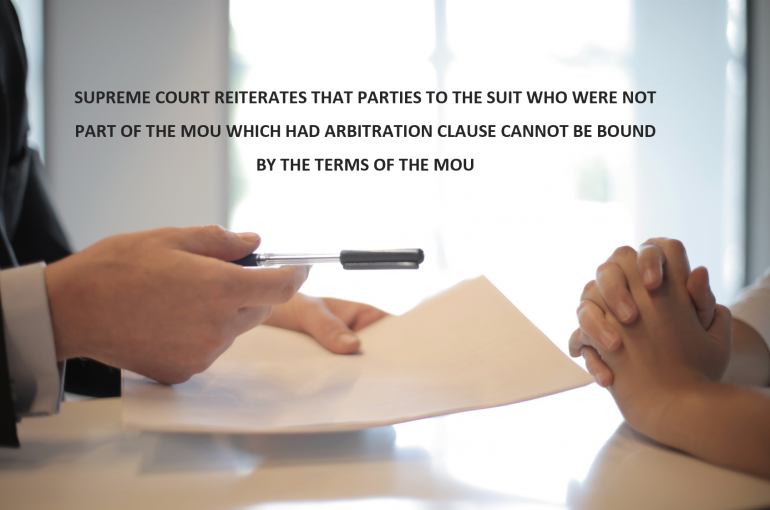SUPREME COURT REITERATES THAT PARTIES TO THE SUIT WHO WERE NOT PART OF THE MOU WHICH HAD ARBITRATION CLAUSE CANNOT BE BOUND BY THE TERMS OF THE MOU
A Three Bench of the Supreme Court comprising of Justice Dr Dhananjaya Y Chandrachud, Justice J B Pardiwala and Manoj Misra passed a Judgment dated 25.07.2023 in a recent case of Vinod Kumar Sachdeva (Dead) Thr Lrs Vs Ashok Kumar Sachdeva & Ors Civil Appeal No. 4656-4657 of 2023 observed that the Parties to the Suit who were not part of the MOU which had an arbitration clause cannot be bound By the terms of the MOU.
Facts
1) In the present case, Vinod Kumar Sachdeva, the Appellant herein, and Ashok Kumar Sachdeva the Respondent herein, are real brothers and are running a Partnership Business under the name and style of Sachdeva & Sons. They entered into a Memorandum of Understanding (MOU) on 14.09.2010 with the terms that the joint family properties should be liquidated to repay the liabilities of the business that had arisen over a period of time in the course of the business. The MOU contained an arbitration agreement in Clause 15 in the following terms:
“15. That in case of any clarification needed or dispute arising, the same shall be referred for settlement and arbitration to Revered Maa Deva Ji and/ or Sh.Surinder Kumar alias Chhindi Ji of Ghaziabad and/ or if required, to any other person to be mutually appointed and decision of the arbitrator(s) shall be binding on both the parties. The arbitration shall however, always be in accordance with the Arbitration and Conciliation Act, 1996 as amended from time to time.”
2) Due to some unfortunate events, the Appellant and Respondent became embroiled in a legal dispute. The Appellant filed a civil lawsuit being Case No. 64/2438/2014 against Respondent No. 1 Ashok Kumar Sachdeva and Respondent No. 2 Sachdeva and Sons Industries Private Limited before the Civil Judge (Junior Division), Amritsar (Trial Court), seeking a permanent injunction prohibiting the defendants themselves, through their officials, agents, privy and representatives from selling or alienating in any manner land having an area of 10 ½ qillas with Khasra Nos. 29/12(8-0), 11/2/1/2(1-13), 11/2/2/2 (1-17), 8/2/1(5-8), 19/1 (5-1), 21/2(5-1), 22/1(6-4), 8/1/1(1-18), 23(8-0), 9/3/2/2(3-11), 24(5-8), 20/1(0-10), 29/13(8-0), 14(2-10), 17(3-18) and 18(8-4) as per jamabandi for the year 2006- 07 situated at Village Gilwali, Chabba, Sangrana Sahib, Tarn Taran Road, Amritsar (Business Properties)
3) Thereafter, the Appellant filed another civil suit, numbered as 28/53/2015, against the Respondents 1 and 2, adding Canara Bank as Respondent No. 3 (Defendant Bank), seeking a decree for permanent injunction restraining the Defendants 1 and 2 from taking over any loan from any other bank as against the properties of the business pertaining to the loan accounts of Defendants No. 1 and 2, and further giving directions to the Defendant Bank to recall back any finance or loan that has been so released by the Defendant Bank to Defendants No. 1 and 2 as against the business properties, with complete costs before the Trial Court.
4) Thereafter, Respondent No. 1 filed an Application under Section 8 of the Arbitration and Conciliation Act, 1996 (Power to refer parties to arbitration where there is an arbitration agreement) seeking a reference to arbitration in both suits. The trial court dismissed the applications by separate Orders dated 27.03.2017 in respect of the Suits.
5) Aggrieved by the Ld. Trial Court’s Order dated 27.03.2017, the Respondent No.1 filed a Writ under Article 227 (Power of superintendence over all courts by the High Court) before the High Court of Punjab and Haryana, (High Court) bearing Case No. CRN 2819 and 2820 of 2017 for setting aside the judgment of the Ld. Trial Court.
6) The High Court passed an Order dated 01.08.2017, setting aside the judgment of the Ld. Trial Court, and directed the disputes in both suits to be referred to Arbitration under Section 8 of the 1996 Act, and further directed the Ld. Trial Court to pass consequential orders.
Supreme Court Analysis and Observations
Aggrieved by the High Court Order dated 01.08.2017, the Appellant filed Civil Appeal No. 4656–4657 of 2023 before the Hon’ble Supreme Court. The Apex Court passed a Judgment dated 25.07.2023 and made the following observations:
i) The MOU that is executed between the Appellant and Respondent No. 1 indicates that the Sachdeva family was carrying on business in several companies, partnership firms, and sole proprietorships under the joint ownership of the Sachdeva family.
ii) That the MOU contains a description of the respective family units and their concerns
iii) That the MOU indicates that there are certain non-family shareholdings
iv) That there are several parties to the suit who are not parties to the arbitration agreement.
v) The Apex Court observed that the MOU was executed exclusively between the Appellant and the Respondent No. 1, and neither Canara Bank nor the Company are parties to the arbitration agreement. Hence the non-family shareholdings cannot be bound by the terms of the MOU since they are not parties to the document.
Conclusion
Thus, based on the aforesaid observations, the Supreme Court held that the MOU was executed exclusively between the Appellant and Respondent No.1, the reference to arbitration under Section 8 of the act was patently in error. The Appeal was allowed and the Order of the High Court was set aside as a consequence of the present judgment. The consequential order which has been passed by the Trial Court shall no longer survive.
K.Suneel Kumar
Associate
The Indian Lawyer





































Leave a Reply